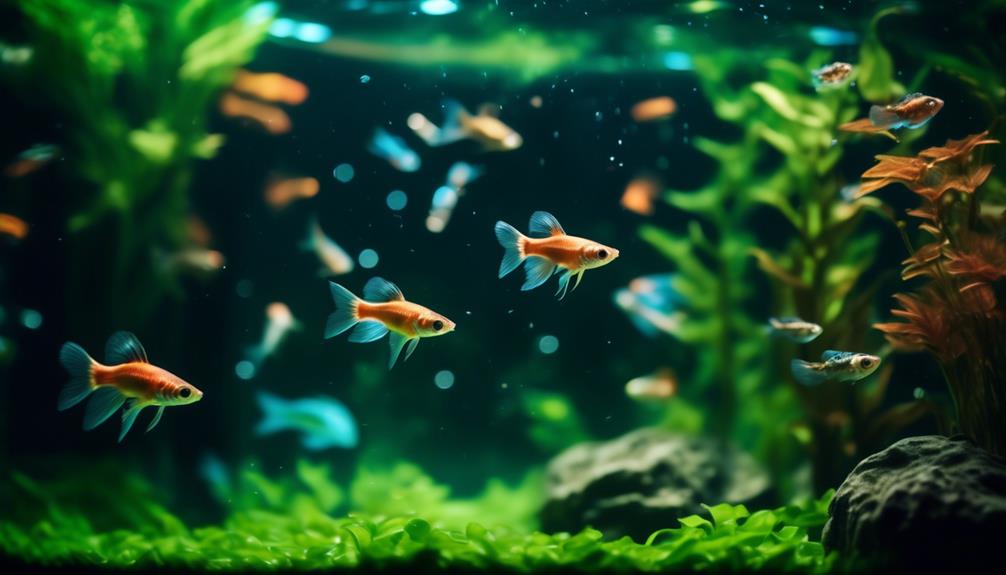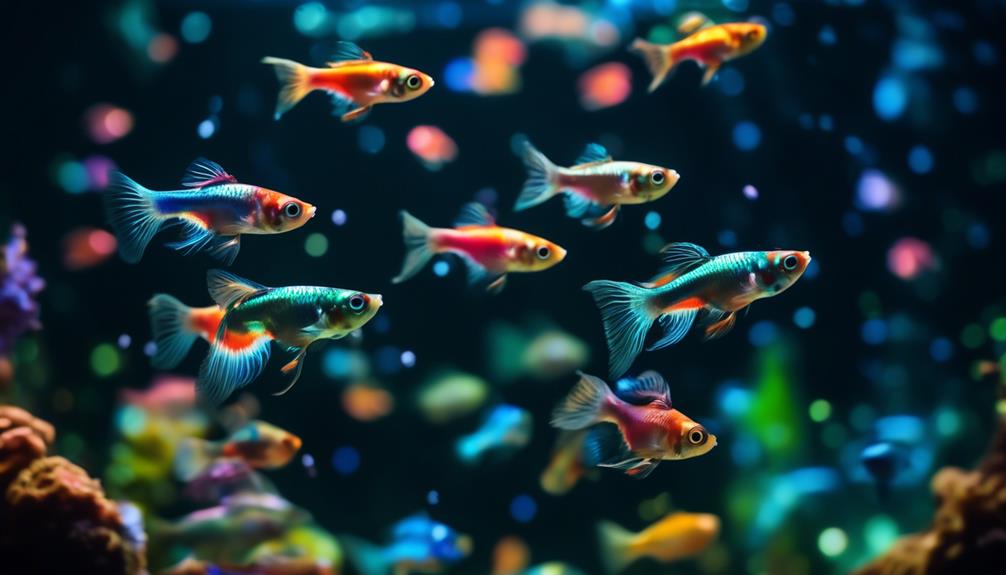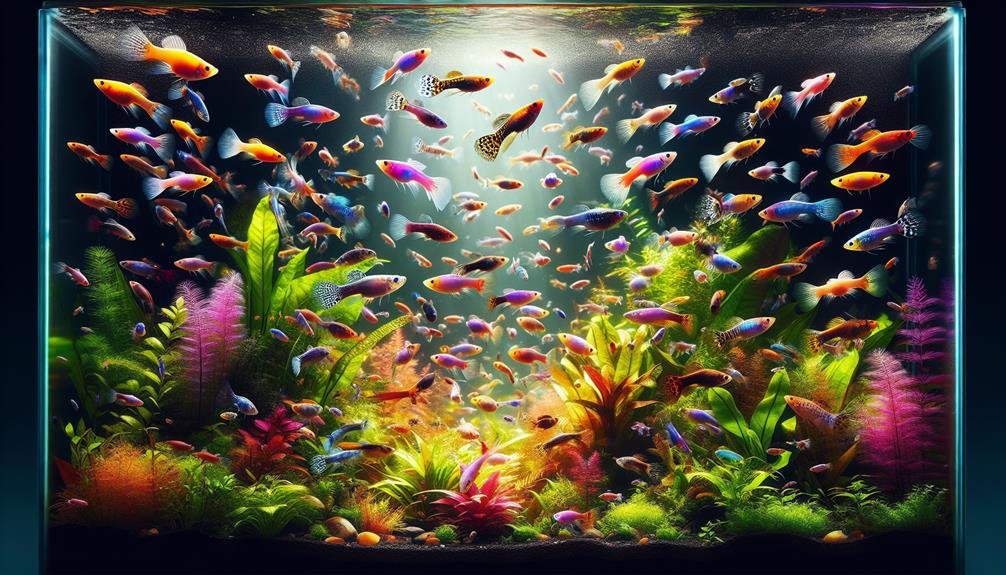Guppies, the vibrant and captivating fish species, have become the talk of the town among aquarists and hobbyists alike. Originating from South America in the 1860s, these small fish were initially bred for their mosquito control abilities. However, they soon captured the attention of enthusiasts when they began to display an array of stunning colors, intricate patterns, and exquisite fin types.
With guppies available in pet stores at various price points, from affordable to high-end, they have quickly become a popular choice for aquarium enthusiasts. But what makes guppies so fascinating? What are the key factors to consider when caring for these aquatic marvels?
In this discussion, we will explore the mesmerizing world of guppies, from their origins and unique characteristics to the essential care requirements that ensure their well-being and longevity. Prepare to be captivated by the wonders of guppies and discover why they are truly a sight to behold.
Key Takeaways
- Guppies are a popular and diverse fish species, known for their wide range of colors, patterns, and fin types.
- When keeping guppies in a tank, it is important to provide the appropriate tank size, cover for baby guppies, and gentle filtration for fry protection.
- Guppies prefer water conditions with a pH level of 7.0 or greater, hard water with essential minerals, and a temperature range of 76 to 78°F.
- Feeding adult guppies once or twice a day with a variety of foods, while avoiding overfeeding, and increasing feedings for fry are important for their health.
Origin and History of Guppies
The origin and history of guppies can be traced back to their discovery in South America during the 1860s. These small, colorful fish were originally used as pest control for mosquitos. Over time, guppies gained popularity for their vibrant colors, patterns, and unique fin types. They were selectively bred to display a wide range of genetic variations, resulting in the diverse and captivating guppy strains we see today.
Guppy genetics have become a subject of fascination among scientists and breeders, who continue to explore the mechanisms behind these beautiful traits. Guppies have also made their way into art and literature, serving as muses for artists and symbolizing beauty and grace in various works. Their presence in the artistic realm further showcases their allure and enduring appeal.
Tank Setup and Maintenance for Guppies
Tank setup and maintenance for guppies involves creating an environment that meets their specific needs and ensuring proper care to promote their health and well-being. To ensure a suitable tank setup for guppies, it is important to consider the following factors:
- Choosing the right tank mates for guppies: Guppies are generally peaceful fish and can be kept with other peaceful tank mates like cory catfish and neon tetras. However, it is important to avoid aggressive or fin-nipping species that could harm the guppies.
- Importance of water testing for guppies: Regular water testing is crucial for maintaining optimal water conditions for guppies. This includes monitoring pH levels, water hardness, and temperature. Guppies prefer a pH level of 7.0 or greater and thrive in hard water with essential minerals. Regular water testing helps ensure a stable and suitable environment for their health and well-being.
- Proper filtration and cleaning: Guppies require a gentle filtration system, such as a sponge filter, to protect their fry. Regular cleaning of the tank, including removing debris and performing water changes, helps maintain water quality and prevents the buildup of harmful substances.
Ideal Water Conditions for Guppies

Guppies thrive in specific water conditions that promote their health and well-being. The impact of water conditions on guppy lifespan is significant, making it crucial for aquarium owners to provide optimal conditions.
One key factor in maintaining guppies' health is water hardness. Guppies prefer hard water, which contains essential minerals like calcium and magnesium. Adequate levels of these minerals are essential for their overall health and vitality. To ensure the ideal water hardness, aquarium owners can add products like Wonder Shell, which not only increases water hardness but also adds essential minerals.
Additionally, maintaining a pH level of 7.0 or greater is recommended for guppies.
Feeding Habits and Nutritional Requirements of Guppies
Maintaining optimal water conditions for guppies is crucial for their overall health and well-being. Now we will explore their feeding habits and nutritional requirements to ensure their proper growth and vitality.
- Guppy Behavior and Social Interactions:
- Guppies are social fish and thrive in communities.
- They display a hierarchical structure within their groups.
- Dominant males exhibit bright colors and engage in displays to attract females.
- Common Diseases and Health Issues in Guppies:
- Guppies are susceptible to diseases such as fin rot and ich.
- Poor water quality and stress can weaken their immune system.
- Overfeeding and improper diet can lead to obesity and digestive problems.
- Feeding Habits and Nutritional Requirements:
- Offer a varied diet consisting of high-quality flake or pellet food.
- Supplement with live or frozen foods like brine shrimp or daphnia.
- Provide vegetable matter such as blanched spinach or peas for fiber.
Breeding and Reproduction of Guppies

The reproductive behavior of guppies, scientifically known as Poecilia reticulata, is a fascinating process that involves intricate courtship displays and a high potential for rapid population growth. Guppies are known for their ability to breed easily and produce large numbers of offspring. Their reproductive success is influenced by various factors, including guppy genetics and selective breeding techniques.
Guppy genetics play a crucial role in determining the characteristics of the offspring. Through selective breeding, breeders can manipulate traits such as color, pattern, and fin shape to create desirable variations. This process involves carefully choosing parent guppies with the desired traits and allowing them to reproduce.
Selective breeding techniques, such as line breeding and inbreeding, are used to enhance specific traits and create new varieties. Line breeding involves breeding closely related guppies to maintain and intensify desirable traits. Inbreeding, on the other hand, involves breeding individuals with very similar genetic makeup to fix and stabilize specific traits.
Frequently Asked Questions
How Long Do Guppies Typically Live?
The lifespan of guppies can vary depending on various factors, such as water quality, genetics, and care. On average, guppies typically live for 2 to 3 years, but with optimal conditions and proper care, they can live up to 4 years or more. Water quality plays a crucial role in guppy longevity, as they thrive in a pH level of 7.0 or greater and hard water with essential minerals. Maintaining appropriate water conditions, providing a balanced diet, and ensuring a stress-free environment are key factors in extending the lifespan of guppies.
Can Guppies Be Kept in a Community Tank With Aggressive Fish?
Guppies can be kept in a community tank with peaceful tank mates, such as cory catfish and neon tetras. It is important to consider the compatibility of fish species to ensure a harmonious and stress-free environment for all inhabitants.
What Are Some Common Health Issues That Affect Guppies?
Common health issues affecting guppies include fin rot, swim bladder disorder, parasites, and bacterial infections. Proper care and nutrition, such as maintaining water quality, providing a balanced diet, and regular monitoring, can help prevent and address these issues in these dazzling aquatic marvels.
How Can I Tell if My Guppies Are Stressed or Unhappy?
Signs of stress in guppies include loss of appetite, color fading, erratic swimming, and hiding. To create a stress-free environment, maintain stable water conditions, provide hiding places, and ensure a balanced diet.
Are Guppies Prone to Jumping Out of Their Tanks?
Guppies require a specific water temperature range of 76 to 78°F for optimal lifespan. They are not suited for brackish water conditions and thrive best in hard water with a pH level of 7.0 or greater.
Conclusion
In conclusion, guppies are a captivating species of fish that have gained popularity among aquarists and hobbyists for their vibrant colors and unique fin types. Their history dates back to South America during the 1860s, where they were initially used for mosquito control.
Today, guppies are bred to showcase a wide range of colors and patterns, making them highly sought after by collectors. Proper care, including meeting tank requirements and maintaining appropriate water conditions, is essential for their well-being and longevity.

